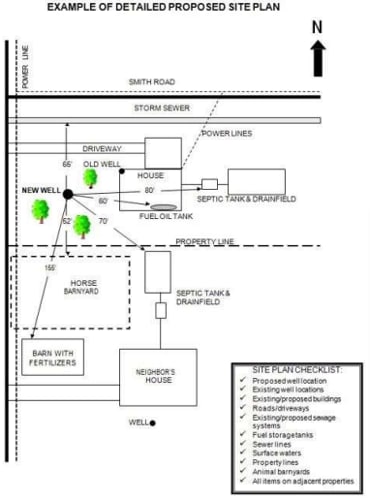Most US states recommend at least 50-100 feet horizontal distance between a septic tank and a water well. A septic tank located more than 100 feet away is even better. However, this distance can vary from one state to another or one area to another. Hence, it is best to consult your local health department about the required setback distance between the septic tank and the water well.
The Environmental Protection Agency (EPA) has discussed regulations regarding septic systems and drinking water in detail. A septic tank can contaminate your or nearby wells under certain conditions.
The contamination risk is higher in the following scenarios
- Well built within 50 feet of a septic tank or vice versa.
- The well is at a shallow depth and in permeable soil
- The well is built at a lower elevation than the septic tank; water flows from the septic tank toward the well
- A neighbor’s septic tank is near your well
- Poor construction and maintenance of the well/septic tank
- Damaged septic tank drains or damaged well casing/cap/screen
The contamination risk is lower when
- The Septic tank and well are located more than 50 feet away
- The Septic tank is located at a lower elevation than well
- The well is dug deeper than the defined layer of silt or clay
- Septic system and well are properly constructed and maintained
- The septic system is pumped and serviced regularly

Image Credits: Department of Environment, Great Lakes and Energy, Michigan
How a Failing Septic System Affects Human Health?
A failing septic system discharges untreated wastewater into the groundwater or the surface waters. The wastewater contains pathogens like E. coli that can cause diarrhea, nausea, headaches, body pains, and other problems.
This water can contact children, pets, and the elderly and cause skin problems. You need to contact your health professional immediately if you get exposed to septic tank discharge.
Tips to Prevent Well Water Contamination from Septic Tank
Distance: Try to build a septic tank as far as away from a well water. You must follow the local health office’s laws about minimum distance.
Well Depth: Dug your well deeper to reduce contamination chances.
Maintenance: Maintain and inspect the septic tank and your water well to mitigate contamination chances.
Test Water Quality: EPA recommends annual testing for private wells. However, you must get your well water tested immediately if you fear contamination from a septic tank.
Septic Tank Health: Avoid throwing plastic, cigarette buds, hair, paint, food peels, or anything solid in drains that lead to the septic tank. It ensures that your septic tank works effectively.
How do Septic Tank Field Lines (leach fields) Contaminate Well Water?
Septic tanks normally discharge into field lines (leach fields). These lines distribute the wastewater from the tank into the upper (aerobic) layer of soil. The bacteria present there complete the wastewater treatment, and the water flows into the soil. If the filed lines are improperly located near a well or are not properly cased, wastewater can make its way into the well’s suction zone. This can contaminate well water.
